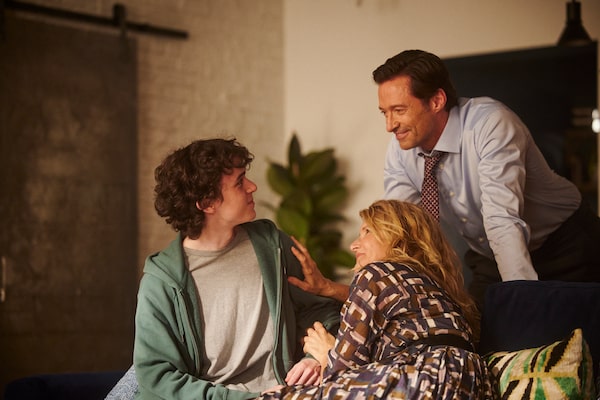
Director Florian Zeller captures the muffling effect of depression rather well in The Son, starring Zen McGrath, left, Laura Dern and Hugh Jackman.Rekha Garton/Courtesy of Sony Pictures Classics / Elevation Pictures
The Son
Directed by Florian Zeller
Written by Florian Zeller and Christopher Hampton
Starring Hugh Jackman, Laura Dern and Zen McGrath
Classification PG; 122 minutes
Opens in theatres Jan. 20
Florian Zeller’s disappointing follow-up to The Father is called The Son – but perhaps The Parent might be a better title. Both films are English-language adaptations of the French writer-director’s own plays, and just as The Father investigated dementia in an elderly man, The Son investigates depression in an adolescent. The difference, however, is that The Father brilliantly captured the senior’s confused mental state with a shifting and contradictory narrative but The Son is more interested in the impact an adolescent’s withdrawal and pain has on his divorced parents, most especially his father.
This is no fault of Zen McGrath as Nicholas, who captures the muffling effect of depression rather well, as though he is always at one step removed from reality – if not in abject pain. Rather it is a fault of point of view: In a script that writer Christopher Hampton has adapted from Zeller’s play, the film’s perspective is largely that of the father, Peter, a highly successful Manhattan lawyer played by Hugh Jackman.
This A-type personality is preoccupied with his work, his pretty young wife (Vanessa Kirby) and their new baby – but he also is such a rational and self-confident character that he finds it impossible to understand a young man who would rather wander the streets than go to school. His initial reaction is that you just can’t do that, although he gradually comes around to the realization he has to help his son, deposited on his doorstep by his ex-wife Kate (Laura Dern) who can no longer cope with the boy.
Creating this rather unsympathetic figure, Jackman hits his lines too hard and too fast, especially in the early scenes, creating an artificiality to the dialogue that makes Peter even less attractive. Dern’s performance is more sensitive, portraying a loving mom hoping against hope that hugs and banana bread will solve the problem. Still, her character is underwritten and Zeller permits Jackman’s loud performance as Peter to remain the focus of the film.

Laura Dern's performance as Kate is a sensitive portrayal of a mother hoping that hugs and banana bread will solve the mental health problems plaguing her son Nicholas, played by Zen McGrath.Rekha Garton/Courtesy of Sony Pictures Classics / Elevation Pictures
The director attempts to portray depression – in Nicholas’s blank stare or desperate tears – but it remains largely a mystery to the frustration of Peter, Kate and the audience. Nicholas has been deeply hurt by his parents’ divorce and the way his father abandoned his mother for a younger woman, but lots of people recover from these sorrows.
Anthony Hopkins steps in with a rather improbable cameo as Peter’s old father, in which he reveals he, too, abandoned his wife and son when Peter was a teen. Why then, one wonders, does Peter seem so blind to his own son’s hurt? Hopkins, clearly relishing the obnoxious role as the cold, hard parent of a previous generation, gives Peter a tough-love talk: Boo hoo, too bad, suck it up. The motivations feel simplistic and the main point seems to be creating a character who can conveniently voice a common misunderstanding of depression: Why can’t you just get over it?
But Nicholas doesn’t get over it, much to his mother’s desperation and father’s guilt. It’s telling that the only significant narrative departure here – of the kind that so brilliantly animated The Father – is one that reveals Peter’s sorrow, not Nicholas’s mental state.
The Son gives us no respite from either man’s plight. It’s not impossible to accept, as one did in The Father, that there is no solution to failing mental health in an old man; that film played out as classic tragedy. It’s almost nihilistic, however, to advance such a hopeless message for a teen. The Son is a film that is very cruel to its characters, and by extension to its long-suffering audience.